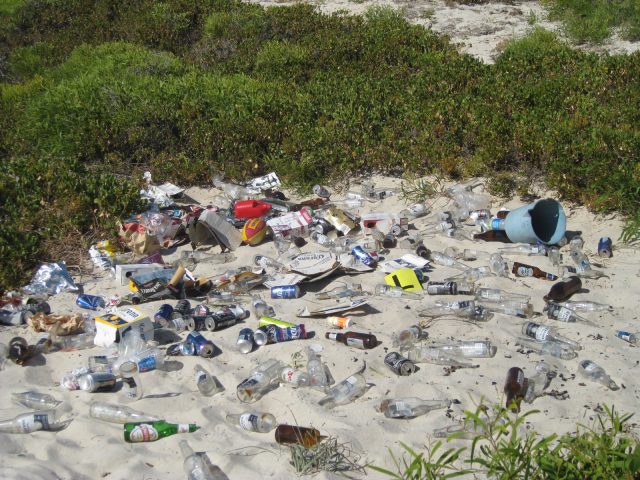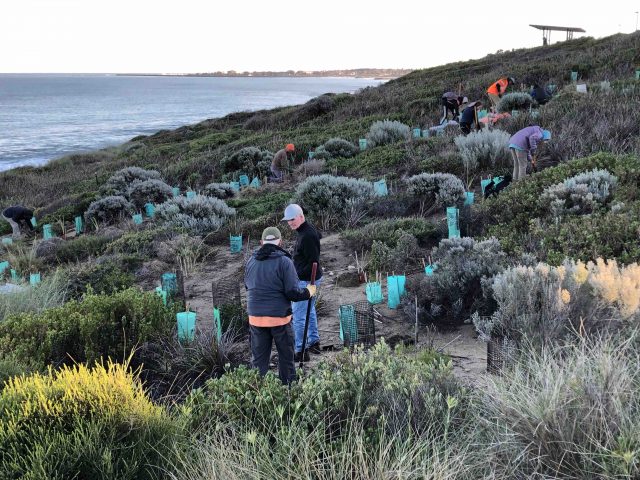We all have a role to play in preserving, protecting and enhancing our pristine and wonderful coastline and beaches.
The City has outstanding local Coastcare leaders like Mike Norman and Don Poynton. Together, they have dedicated over five decades of volunteer work to help preserve, enhance and protect our pristine coastline and habitats, its rare and unique flora and vegetation communities, and the wonderful wildlife that calls it home, including Quenda and the Graceful Sun Moth. This incredible duo share their top five tips to empower you to care for our coastlines and enjoy our beautiful beaches.
Our natural coastal habitats need your help
Climate change is the biggest threat to our coastline, and we have already begun to see its effects on our local beaches. Coastal hazards, such as sea level rise causing coastal erosion and damages from storms, will only continue to degrade our City’s stunning beaches. There is a lot that residents can do to protect and conserve our natural coastal habitats.
Coastcare Tips
- Enjoy long walks along the beach (not the dunes)
Native dune vegetation and dune structures can be easily destroyed if people or pets roam on the sand dunes. Friends Group volunteers try their best to maintain and revegetate the sand dunes with coastal seedlings. Admire their hard work from afar next time you visit the beach, or even enjoy the views from the City’s coastal shared path which runs the full length of the coastline.
- Avoid fence sitting
Don’t climb or break the conservation fencing around the dunes, especially on the ocean side. Doing so will allow easier access for people and animals to enter the dunes, harming the vegetation and dune structures. Fencing is costly to repair and can take time to fix.
- Keep our beaches pristine clean
If you have rubbish left from your fun day at the beach, be sure to discard it in the bins provided. Allow everyone to enjoy a beautiful, litter-free beach, even after you leave. Any rubbish you discard on the beach will likely end up as marine debris that can harm many sea creatures.
- Recycle, don’t dump
Containers for change is a great way to recycle your drink containers rather than leaving them on the beach. Donations can be made to our Coastcare groups by depositing containers under the scheme ID C10379297.
- Live sustainably
Help reduce the effects of climate change on our shores by limiting consumption, reusing, and recycling your waste and lowering your carbon footprint. Don’t just enjoy nature but do your best to take care of it so we can all keep enjoying our environment into the future.
- Get involved
Even if it’s just for a few hours a year, helping out a Friends Group with some of its on-ground work will not only spoil you with stunning scenery, but you will learn more about the coastal environment and help restore the dunes and beaches!

Get involved in caring for our coastline
There are a range of ways you can get involved with restoring and maintaining our coastline. You can volunteer with your local coastal Friends Groups. Some examples of Friends Groups’ activities caring for the coast include:
- Revegetation and planting.
- Monitoring and recording of flora and fauna.
- Weed control.
- Guided nature walks where you can learn about our natural areas.
- Rubbish clean up.
- Seed collection.
- Community education (talks and presentations).
- Fire prevention.
New and returning volunteers are always welcomed. Some events require registration, for others you may be able to turn up and introduce yourself. If you have a passion for nature and conservation, or are just interested to learn more and help the community, find out more about Friends Groups within the City’s webpage.
Protect our beaches at all times of the year
Abalone season is a time of year where there can be negative impacts on beaches. Coastal vegetation and fencing can be impacted by those trying to fish for abalone.
If you see anyone trampling on vegetation, littering, illegally parking, going into fenced conservation areas, or causing other disruptive behaviour on our beaches, please report incidents to our Field Officers by calling 9400 4000 or 1300 655 860 after hours.

